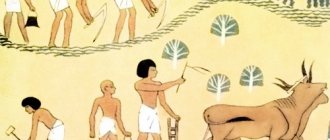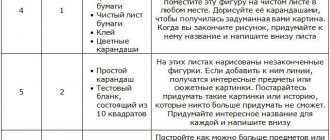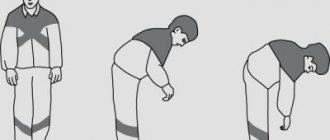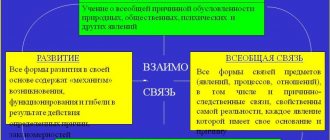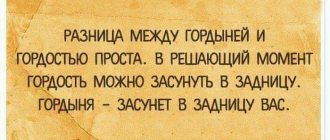The universe is not against us
To live according to the principles of wu wei, you must first understand your connection with everything in nature. And although we must have clear boundaries, like children who run and play outside the fence of the park, we must remain open and not afraid of vulnerability. Then we will be able to contemplate nature and feel the flow of world energy, and then we will learn to act in accordance with it.
Realizing that we don't have to fight the Universe, that it's not against us, will bring a sense of freedom.
Chinese wisdom about life
“If your heart is filled with love, then you cannot offend another person.”
“If you hate, it means you have been defeated” Confucius
“A wise man does not do to others what he does not want done to him” Confucius
“There is beauty in everything, but not everyone can see it” Confucius
“Your home is where your thoughts are calm”
“When doing good to people, do not demand gratitude from them. If you demand gratitude from them, your desire to do good will cause harm.”
“Don't speak unless it changes the silence for the better.”
“With money you can buy a watch, but not time”
“What happens happens at the right time.”
“A hut where they laugh is richer than a palace where they are bored.”
“Just because you tripped and fell doesn’t mean you’re going the wrong way.”
“Always look at things on the bright side, and if there are none, rub the dark ones until they shine.”
“The one who points out your shortcomings is not always your enemy; the one who talks about your merits is not always your friend.”
“Don’t be afraid to hesitate, be afraid to stop.”
“The temptation to give up will be especially strong shortly before victory.”
“The sovereign is like a boat, and the people are like water: they can carry you, but they can also drown you.”
“A great river flows quietly, a smart man does not raise his voice.”
“A noble man is serene in his soul. The lowly is always concerned” (Confucius).
“Live with peace. Come spring, and the flowers bloom themselves" .
If we know so little about life, what can we know about death? (Confucius).
With money you can buy a watch, but not time (Chinese folk wisdom).
A noble man knows his superiority, but avoids competition (Confucius).
Aimless movement
Nowadays, lack of purpose is considered unfitness for life. However, modern life can hardly be called harmonious.
The Chinese philosopher Chuang Tzu recommended a way of life that he called aimless movement. To explain, he drew an analogy with the activities of an artist or craftsman. A talented woodcarver or a skilled swimmer does not think or weigh the sequence of his actions. His skill has become so much a part of himself that he acts instinctively, spontaneously, without thinking about the reasons. This is precisely the state that philosophers sought to achieve with the help of wu wei.
New in blogs
- Posted by Aurora, January 9, 2022 at 4:27pm
- View blog
“That is why a perfect person, truly wise, does not commit deeds. And in this he imitates the Universe.” Wisdom of Lao Tzu, 68
One of the most important principles of Taoism is the principle of “non-action,” or wuwei.
Unfortunately, the true meaning of the term wuwei has been conveyed incorrectly for thousands of years, resulting in incredible confusion and misconceptions.
The source of this confusion is one of Lao Tzu's most famous verses, in which he introduces and describes the concept of wuwei
In most translations of the Tao Te Ching, wei is translated as “action”, “deed”, and wuwei is translated as “inaction”, “non-action”.
However, a more accurate translation is by Lin Yutang, who translated wei as “intervention” and wuwei as “non-intervention.”
It turns out that, if read correctly, Taoist “non-action” is actually non-interference (mind your own business).
Misinterpretation of non-action is not just about the meaning of the word - it has important consequences for the practitioner of Taoism.
By perceiving a wrong principle, a confused person simultaneously perceives a wrong view of the world.
As a result, he behaves incorrectly when solving complex problems that life puts before him.
What is even sadder is that this mistranslation from Lao Tzu is precisely what most people are attracted to.
According to them, when Lao Tzu writes:
“Everything is accomplished by non-action” (Wisdom of Lao Tzu, 229),
he promises them that everything in their lives will be wonderful if they literally avoid any action.
This calms the average person down, because it eliminates the need to fight for anything.
In the minds of the masses, Lao Tzu's principle of non-action serves to justify avoiding conflict.
Their confused view of the world (which is supported by the propaganda of social and religious institutions) creates the idea that any interaction between people can get by with rational discourse and passivity.
Action simply attracts unwanted contradictions. This absurd interpretation has a powerful appeal: don't act, because action creates problems.
In addition, for weak people, inaction is a way to evade responsibility.
In this case, the interpretation of the call to "abide in non-action" is philosophically expanded to place responsibility for what happens on others: people, external forces, natural events, gods and circumstances.
In short, for anything and anyone, just not for yourself.
The consequences of such a view are not immediately apparent. A lazy, cowardly and unlucky person abdicates responsibility, once again confirming the weakness of human nature.
In such a state of confusion and confusion, a man does not need to be responsible like a man. A woman does not need to take on feminine responsibility.
This loss of personal responsibility leads to the loss of the natural principle, which for Taoists is a model of reality.
As we follow the path of life, we ultimately have to give an account for everything we have decided to do and what we have given up.
This idea is so important in Taoism that for thousands of years the entrances to classical Lao temples were decorated with the inscription: “Everyone is responsible for his own actions.”
Words are of little value, actions are valuable. A fool who follows the path of inaction chooses to believe in words that are empty in front of the face of reality.
The deluded person hiding behind such a false interpretation confirms the superficiality of human nature.
The distorted interpretation of the principle of non-action is remarkable in that it cannot be applied to anything in the real world.
How can an entire philosophical system be built around something that essentially means: just sit and everything around you will take care of itself?
How can such an idiotic idea be taken seriously?
No one in their right mind would agree that food, money, shelter and friendship with people will magically appear through inaction.
Instead, it takes proactive steps to pay the bills, keep ourselves in good shape, bring happiness to those we love, and fend off unwanted guests in our home.
Or, if we turn to nature as a model, imagine a gazelle, which, having noticed a sneaking lion, lies serenely on the grass.
Can such a gazelle be expected to live a long life and bear offspring?
This false interpretation of the concept of non-action is the invention of mentally retarded intellectuals and priests who have never been forced by life to take risks.
Reveling in their self-indulgence, they are model losers who look down on those for whom life is a battle expressed through action.
Such people sometimes win, sometimes lose, but at least they act within the limits of their abilities.
By giving preference to incessant inaction, a confused and deluded person thereby excludes himself from the cycle of life. Taoism views life as a cycle of development in motion, a wheel whose rotation brings constant change and which requires energy.
One who masters inaction advocates the absence of movement, change and energy.
And, thrown to the sidelines of life, an inactive person cannot expect that his philosophy will bring him any benefit.
On the contrary, he can expect only difficulties and failures.
Still water becomes stagnant. Stagnation of blood causes gangrene. An unkempt animal is unhealthy.
Society treats idle people as always busy slackers and as creatures who are not given human relationships. Money will not be available to those who are inactive.
In short, the champion of inaction-inaction, proudly relegating himself to the sidelines of life, dooms himself to spiritual and physical suicide. His vision of the world is absolutely inconsistent with reality.
Lin Yutang shows this well:
“And it is quite clear that, living in the world among people, it is impossible to completely abstain from activity, so in the end you choose an attitude of moderate passivity and tolerant calm as the wisest way of life.” Wisdom of Lao Tzu, 194
The student of Tao considers both sides of any phenomenon in order to find out its true meaning and scope. This consideration of opposites is one of the most important theories stemming from the Yin-Yang principle.
As the Yin-Yang diagram shows us, the circle of nature requires that opposites interact for balance and harmony: day and night, life and death, summer and winter.
This alternation, called the principle of the unity of opposites, can be applied to learn how to truly use non-action.
Therefore, we must consider the relationship of action and non-action in order to determine the basic question regarding non-action: how do the peace, calm and serenity contained in non-action relate to the effort, movement and struggle contained in action?
source
Stages of development
In the first century BC. e. Schools of Taoism began to appear. Over time, they changed, and some merged into one institution. Main institutions:
- School of Heavenly Mentors;
- Quanzhen;
- Maoshan;
- Lingbao.
The School of Heavenly Masters, or “Five Buckets of Rice,” was the first to teach the basics of Taoism. It was founded by patriarch and mountain hermit Zhang Daoling. Over time, it was divided into southern and northern. But then the establishment became united again, its name changed to Zhenyi.
In the southern regions, in the times after the dominance of the Mongol tribes, the Quanzhen school opened. Maoshan or Shangqin existed until the 14th century. Here students practiced communication with spirits and higher powers. Lingbao focused on meditation; it was more like a Buddhist school.
In the fifth century, the number of adherents of Taoism increased: they were joined by hermits who dreamed of longevity. The doctrine at this time turns into religion, and its goal becomes the desire for immortality. At that time there were only 250 treatises with basic definitions, principles and concepts. And today there are more than 1,500 books and essays.
Taoism is not considered a traditional religion. It is based on the principle of equality of humanity. Thanks to this, philosophy was studied by different categories of people. But in the Middle Ages, monasteries were built where only enlightened monks were allowed.
In the 17th century, the Qing dynasty ruled, which encouraged the persecution of philosophy. The rulers considered the teaching to be pseudoscience, so they ordered to burn books, destroy monasteries, and punish supporters of Taoism. Rehabilitation began only in the 60s of the last century. But modern philosophy is different. It was based on meditation and magical rituals.
The teaching became famous in the West thanks to its unique martial arts, breathing exercises, and Feng Shui.
Meditative contemplation
Consider the Taoist practice of contemplation. To comprehend the harmony of the world order, you need to focus on your inner world and observe the flow and change of thoughts and images. Observe how they appear and disappear, your sensations from this process. Gradually you will realize that the cause of all thoughts is the activity of the mind.
It is your mind that creates thoughts that are the source of all problems. Tao suggests freeing your mind from thoughts, and then you will notice that your problems have disappeared along with them! When you have mastered this practice, move on to the next one - stopping the occurrence of thoughts. How to do it? You must not allow thoughts to arise. You have already studied the nature of mental activity and understand how thoughts appear in your head - just don’t let them appear.
When you free your mind from the flow of thoughts, you will experience inner peace. In this state, the world is perceived completely differently, all emotions are balanced, and a feeling of harmony appears. Inner harmony manifested itself through stopping the chaotic flow of thoughts.
Do I need to read any mantras during this practice or focus on something? No, inner contemplation takes place in complete silence. This practice can be done anywhere and in any position - sitting, lying down, while walking. Over time, you will get used to this practice and will feel the need to free your mind from the chaos of thoughts and images.
